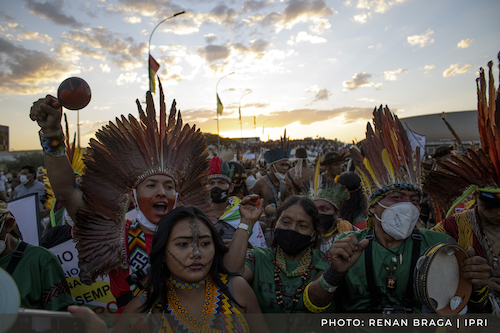 Indigenous Peoples in Latin America are facing a profoundly grave situation. They are on the losing end in the gap between the development of national and international normative standards for the protection of their rights and their lack of implementation on the ground. They not only face the State’s force, imposing “development” projects and dispossessing them from their lands; but also illegal armed groups that dispute their territories with deadly force.
Indigenous Peoples in Latin America are facing a profoundly grave situation. They are on the losing end in the gap between the development of national and international normative standards for the protection of their rights and their lack of implementation on the ground. They not only face the State’s force, imposing “development” projects and dispossessing them from their lands; but also illegal armed groups that dispute their territories with deadly force.
In this context, Indigenous Peoples are often the target of violence with impunity that is intended to undermine their collective resistance and grab their lands and resources. Some of these actions include: extrajudicial executions, criminalization of leaders and communities, torture, abuses against women, and forced displacements.
In Latin America, three countries lead in the number of assassinated human rights defenders: Mexico, Colombia, and Brazil. Here are some of the main findings of the Indigenous Peoples Rights International’s country teams compiled for International Human Rights Day,:
Brazil
During the last five years, violence against Indigenous Peoples has intensified. The rhetoric and the actions of the Bolsonaro administration violate internationally-recognized rights of Indigenous Peoples, often treating Indigenous Peoples as enemies. Continued public misinformation and anti-indigenous discourse are massively echoed in the media and in the different branches of government. Bolsonaro’s attacks and threats guide the actions of paramilitary groups and armed militia that drive illegal deforestation and extractive activities, land grabbing and invasion of Indigenous territories, among other violent actions.
Communities suffer when their members are victims of violence. Indigenous Peoples also face a justice system that criminalizes them and that still recognizes them under the guardianship of the State’s indigenous institution. They do not have access to adequate legal representation. Public institutions that should guarantee Indigenous Peoples’ rights have been constantly undermined and public policies for intercultural and environmental issues have been rolled back. This has had a direct negative impact in the quality of life of Indigenous Peoples.
This situation has worsened in the context of the pandemic. Under the guise of economic recovery, authorities have concealed legal actions to dispossess Indigenous Peoples from their lands.
Despite this, Indigenous Peoples have defied this discourse and stood up against actions that violate their rights. Their struggle has often resulted in trumped-up charges against their leaders, stigmatization, criminalization of collective struggles, and even judicial actions, as in the Time Frame case currently discussed at the Supreme Court of Brazil.
Colombia
In Colombia, Indigenous Peoples face continuous attacks on multiple fronts. External forces occupy their territories, especially in the departments of Chocó, Nariño, and Cauca. There have been numerous cases of killings, injuries, displacement, armed confrontations, dispossession of their territories, anti-personnel mines, and the confinement of the population.
The UN Office of the High Commissioner for Human Rights received 180 allegations of homicides against human rights defenders between January 1 and October 31, 2021. The Institute of Studies for Development and Peace (INDEPAZ) registered, until November 9, the killing of 152 human rights defenders and social leaders. Many of these were indigenous.
During the national mobilization of 2021, Indigenous Peoples united in “La Minga”. Government and private actors responded with physical and rhetorical attacks against the demonstrations and those supporting them.
Mexico
Mexico is a State characterized by a serious human rights crisis. It is deeply affected by the collusion between State authorities (at all levels) and drug cartels. This is worsened by an atmosphere of almost total impunity.
Indigenous Peoples suffer growing attacks from violent criminal groups that dispute their territories, using forced disappearances, torture, and executions. The State’s actions have raised conflicts between communities, some are internally displaced by organized crime or evicted by corporations. The State continues to deny the recognition of Indigenous Peoples rights, particularly through political and legal actions to avoid compliance with Free, Prior and Informed Consent.
IPRI documented that, by June 2021, fourteen indigenous human rights defenders had been murdered. These crimes have not been brought to justice and impunity persists, with no positive outlook for justice and redress by the State.
These three countries demonstrate the high costs that Indigenous Peoples pay for the defense of their lands, resources, and the environment. However, we can also find processes of resistance, advocacy, and creation of grassroots alternatives.
Indigenous Peoples and their processes need allies and solidarity. Indigenous Peoples are building solidarity bridges through a series of documentaries and short videos. To find out about these stories, visit: www.iprights.org
Republished with permission. Indigenous People’s Rights International.



